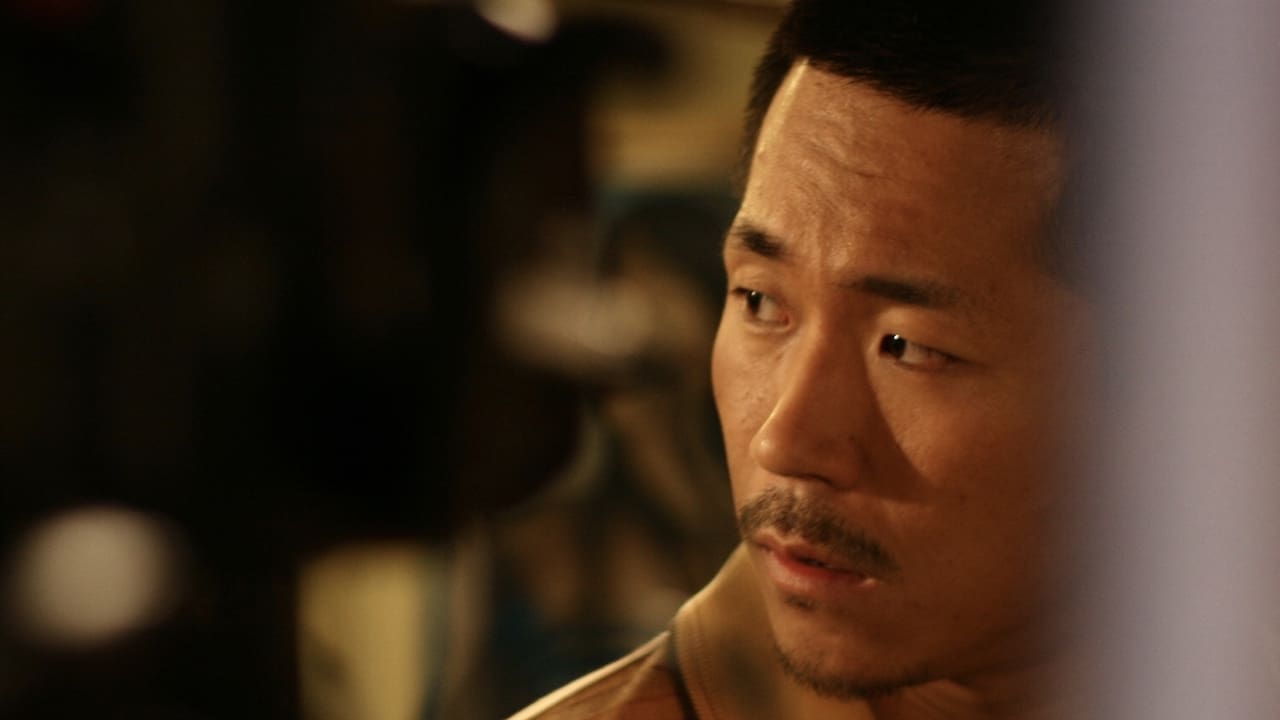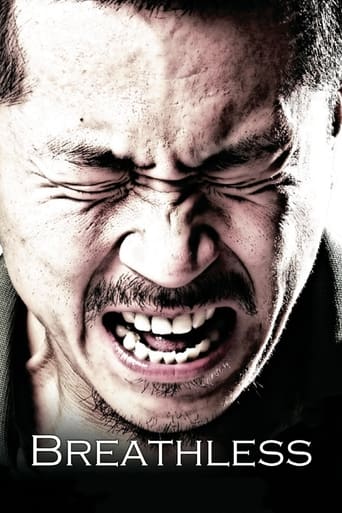

I love this movie so much
... View MoreHorrible, fascist and poorly acted
... View MoreGood start, but then it gets ruined
... View MoreThis is a coming of age storyline that you've seen in one form or another for decades. It takes a truly unique voice to make yet another one worth watching.
... View MoreYang Ik-June does a spectacular job writing, directing and starring as Sang-hoon in "Breathless". The almost pessimistic approach of the film is more complimented by its original Korean title "Ddongpari", which literally means "Shitfly".The film is said to be semi-autobiographical with inspirations for the story coming from the abusive childhood of the director. He even had to sell his house for the completion of this film, which shows how important this film was for him. The portrayal of raw violence in the film is so authentic and shocking that even while showing glimmers of hope the viewers are left with a pessimistic outlook towards the film. Almost in every single scene, there is some kind of use of cursing. The obscene language along with the violent and bloody nature of the film makes it a film that won't be suitable for every kind of audience. Full review at http://www.asianfilmvault.com/2017/08/breathless-2008- by-yang-ik-june.html
... View MoreLet me start by saying that this piece of art took me by surprise. I didn't feel that I was watching a movie, Instead the acting was so realistic that I felt I was part of it. Please watch this movie and feel the greatness of Asian Cinema. It is also a tearjerker!!!! This can be a very sad film as well. I doubt if I've ever watched this without a few tears in my eyes at certain points. PS: I would like to recommend this to every movie buff who admire Asian Cinema."In this life, it's not what you hope for, it's not what you deserve -- it's what you take." Thank you
... View More(MAY CONTAIN SPOILERS) Arguably, extreme violence – or ultra-violence as Burguess would put it - has been one the most prominent traits of Korean cinema in the last decade, to the point that for many mainstream cinema-goers, it came to define it. The worldwide success and broad critical acclaim of Park Chan-wook revenge flicks, filled with gore and stylised perversity overshadowed the diversity of one of the most productive and inventive national film industries to create a stereotypical sub-genre: the extreme Korean thriller. Thematically, Breathless does not seem to disappoint the viewer's expectation: from the opening frame to the last scene, the film is relentlessly violent – but its depiction and meaning could not be more remote to Park Chan-wook's universe. Yang-Ik Jook, the director who also displays an impressive intensity in the leading role of his first feature, opts for a naturalistic approach to filming – all close-ups, simple shots and hand-held camera – light years from the complicated, westernised, post-Fight Club aesthetic of Park's vengeance trilogy. The epitome of Park Chan-Wook's visual style when dealing with violence can be found in Old Boy, with the infamous brawl in the jail corridor, where the lone hero overcomes one by one all his attackers in a virtuoso tracking-shot directly inspired by the beat-'em-up video games. Violence here is unreal: "just fun" - like in a Tarantino movie. In contrast, Sang- hoon, the main protagonist of Breathless, a debt collector spending his days beating to a pulp every single human being in sight, doesn't even know what a Playstation is (which he actually calls a "Play-shit"), until he agrees to buy one to his nephew, in a rare display of kindness. In a film saturated with symbols and totemic items (western child toys, knifes, phones, hammers), the introduction of the Playstation can be read as a departure from this insensitive, immature and virtual approach to the issue that is violence; and more specifically in Breatless' case, domestic violence. A moral tale about domestic violence and its consequences, the film reproduces the cyclical nature of child abuse. The bullied child becomes the bully; the victimised mother produces a traumatised daughter, a beating follows another beating and so on. This makes the film structurally repetitive and quite predictable, but remarkably, it also gives a forceful depth to the directors' hard-hitting argument about the responsibility that victims have in perpetuating the cycle originated by their tormentors. After an uncompromising first hour letting the viewer astonished and weary of Yang-Ik Jook shock and awe approach, the director suddenly introduces a sentimental edge to Breathless with an unexpected touching montage of the two main characters (the thug and the high school girl) taking the gangster's nephew to the fair, where he can, at last, be a child again. This passage, with its cheesy oriental music, is very reminiscent of Takeshi's Kitano similarly tender moments in his romantic gangster chronicles. This is also the only time, along with another pivotal twist taking place later on in the film (the father's suicide attempt), that Yang-Ik Jook uses mood music – the rest of the soundtrack containing only diegetic sounds of incessant kicking, punching, slapping and screaming noises, which provide, like a percussion set, the internal rhythm of the film.Littered with more swear words than a vintage Scorsese epic, Breathless, whose original title Ddjongpari could be translated "fly-shit", is also a study of the social alienation that comes with the lack of education that often originates in the trauma of child abuse: its main characters don't have the words to express their frustrations but only their fists and can only mimic what they have witnessed. Even marks of affections are sent through play-fighting (Sang-Hoon and his nephew) or verbal abuse (Sang-Hoon and the adolescent girl he calls "crazy bitch"). School education is regarded as important by all characters (the wannabe gangsters are always asked if they graduated from high-school by the mob boss) but remains a vacuous, distant, superficial dream, alien to their world of poverty and violence. The ending works superbly in a series of symmetrical narrative motifs, leaving room for hope as seen in the concluding flash-forward. The transformation of Sang-hoon is brutally quick, but remains believable. A martyr of child abuse, his will to change his ways and break the cycle will eventually kill him but save his family. It is a powerful conclusion to an overly brutal film that leave bruises like a punch in the face, but also handles its gentle moments with a disarming sincerity.More film reviews at ggendron.wordpress.com
... View MoreUnfortunately some technical issues marred the supposedly powerful introduction where violence get unleashed by all characters on screen both physically and verbally. Clearly played from a DVD screener with the "Showbox" watermark, the audio was left silent for the good part of some verbal barrage, which to the prudish might seem like music to their ears.If there's one thing I learnt / have reinforced after the movie, is how ubiquitous the Korean swear word which sounds phonetically like "shee-bal" can actually be. It's more versatile than the English language's F-word, and the Korean one can be used to describe a whole host of bodily parts both male and female, with colourful adjectives strung together as well. Either that, or the person subtitling the show has some really colourful imagination to tag some appropriate swear words of his/her own liking, in order to spice up the dialogue for non-Korean speaking audiences.Breathless is almost like a one-man effort, with Yang Ik-June wearing a number of hats in producing, writing, directing and starring in the lead role of Song-hoon, a violent gangster who doesn't have to think twice when deciding to lay hands on his victims, and insulting them concurrently with his foul mouth. He's a debt collector in a small outfit which he co-founded, but finds more pleasure in being a field agent, bringing along underlings whom he can abuse as well, and show the ropes to, in teaching the essence of collecting money, and to show no mercy to those who cannot pay up.Most of the violence happen off screen, though the aftermath is seldom shielded in order to elicit a response from the audience. It actually makes for a great 3D movie with objects flying all around and at the screen, from furniture, to fists, and even spit, and I enjoyed the many unintentionally comedic moments that Ik-June effortlessly paints into his narrative despite the very negative elements of violence and language that pepper throughout, and almost every character was left tainted by dishing out, or be at the receiving end of bad signs or an uncouth mouth.I suppose the question here is, and the issue that Ik-June could have wanted to address, is that of violence, and domestic violence even, if a circumstances of a tragedy would lead to impressionistic youths turning to violence as a means of release and addressing their emotions. Or more directly, if being brought up in a violent environment would lead to the nurturing of violent tempers, given the lack of proper role models, and being unable to break out from the vicious circle as that painted in the film.Breathless may seem a little too long as it had attempted to give each character equal opportunity to shine, from the schoolgirl that Song-hoon befriends, to his boss, a young boy whom he takes as his own, and his mother, coupled with a protégé in the making. It's quite the complete story serving as a cautionary tale and a statement of the never-ending cycle, but would have benefited from tightening up the pace a little and could have gone under 2 hours. That said however, it did result in enough apathy given toward the characters here, given the anti-heroic stance they're all under, and you'll buy into its story of redemption toward the last act, and the fortification of the positive relationships that Song-hoon had, through his own violent ways, brought together.
... View More